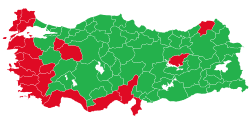Turkish constitutional referendum, 2010
| Turkish constitutional referendum, 2010 | ||||||||||||||||||||||
|---|---|---|---|---|---|---|---|---|---|---|---|---|---|---|---|---|---|---|---|---|---|---|
| Constitutional referendum for 26 articles of the constitution. | ||||||||||||||||||||||
| Date | 12 September 2010 | |||||||||||||||||||||
|
||||||||||||||||||||||
|
||||||||||||||||||||||
| Source: Turkish Supreme Election Board (YSK) | ||||||||||||||||||||||
A constitutional referendum on a number of changes to the constitution was held in Turkey on 12 September 2010. The results showed the majority supported the constitutional amendments, with 58% in favour and 42% against. The changes were aimed at bringing the constitution into compliance with European Union standards. Supporters of Turkish EU membership hope constitutional reform will facilitate the membership process.
The pro-Kurdish Peace and Democracy Party (BDP) declared that they would boycott the vote, because it is not mentioned in the constitution that Kurds exist in Turkey.
After the military coup of 12 September 1980, a new constitution was drafted, designed by the military junta that came to power. Thirty years later, a referendum was held regarding a number of amendments to that constitution.
In 2010, the Turkish parliament adopted a series of constitutional amendments. The amendments did not achieve the required two-thirds majority (67%) for immediately implementing the changes. However, a majority of 330 votes (60%) was achieved and sufficient to present the amendments to the electorate in a referendum. A constitutional change, to make it more difficult for the Supreme Court to dissolve parties, failed to pass.
The reform package was accepted by parliament on 7 May, initiating the referendum process. The referendum was expected to be held 60 days after the publication of the package in the Official Gazette, but the Supreme Election Board (YSK) announced that it would be held 120 days later, on 12 September.
Provisional Article 15 of the Constitution, which provided protection to coup leaders, will be abolished. The amendments will allow the leaders of the 1980 coup to be sent to court. Military officers who commit crimes against the state, such as preparing coup plans, will be tried in civilian courts. Military personnel who are dismissed from the Turkish Armed Forces will have the right to appeal to the judiciary, the right to legal remedies and the right of defense.
Personal information such as names, photographs and ID information will be kept private. This kind of information will be stored only if the individual agrees to it, and individuals believing their personal information is being misused will be able to hold relevant entities accountable.
Businesspeople with tax debts will be able to travel abroad. Businesspeople facing an investigation or prosecution are prohibited from traveling abroad under current regulations. In the amendments, businesspeople will be able to travel abroad provided there is no court order restricting their travel.
...
Wikipedia

